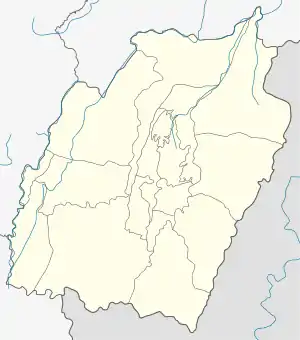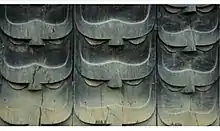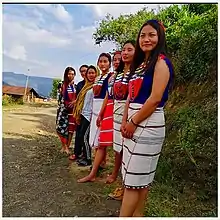Chingjaroi
Chingjaroi, originally known Asinei or Asewnei alternatively called Zingchui/Zingjui by the tangkhul, Shomai (graceful people) by the Poumai and khatchomi by the chakhesangs is a large village located in northern Ukhrul district, Manipur state, India and bordered mainly by villages like Jessami, Tasom, Chingai, Marem, Peh, Phaibung and Laii (Gaziphema)originally. Later villages like Razai, Namrei and Kharasom came to settle in the land of chingjaroi and became its neighboring villages. The village consists of three sister villages, namely, Chingjaroi Khullen, Chingjaroi Khunou and Chingjaroi Christian Village. Chingjaroi Khullen the nearest from the National Highway 150 is approximately 84 kilometers from Ukhrul district headquarters.
Chingjaroi
Asini
,Zingjui by the tangkhul,shomai by the poumai , Khatchomi by the chakhesang | |
|---|---|
village | |
 Chingjaroi Location in Manipur, India  Chingjaroi Chingjaroi (India) | |
| Coordinates: 25°23′34″N 94°24′33″E | |
| Country | |
| State | Manipur |
| District | Ukhrul |
| Population | |
| • Total | 6,653 |
| Languages | |
| • Official | Tangkhul (Amahsha-dei/Zingjuitui and many also understand poula(poumai language) |
| Time zone | UTC+5:30 (IST) |
| PIN | 795142 |
| Vehicle registration | MN |
| Nearest city | Ukhrul |
| Literacy | 80% |
| Lok Sabha constituency | Outer Manipur |
| Vidhan Sabha constituency | Chingai |
| Website | manipur |
Origin

Resu, the founder and the first Khullakpa, originally lived at Khundei hill. From there he moved to what is now the site of Phaibung Khunuo. One day he went hunting, and wounded a large deer. He followed the tracks to a pool of water near the present site of the Khullakpa's house (Khullen). He climbed a tree and found millet, which he took. Next morning he went home, and his wife offered him rice and zu, but he refused it. That night he sought omens in a dream, and the dream told him to change the site of his village. He was to tie a rope around the neck of his mithun and a stone to the other end, turn the mithun loose and follow it. When the stone fell off, the site was reached. However, he found a suitable site behind the present one, and did not wait for the stone to fall. As he was clearing his house-site many lice came up from the ground, and after he had settled there tigers came and killed his cattle. Then he remembered the omen of the lice, and moved up to the present site of Chingjaroi, where he built a house in the position of the present Khullakpa's.
He prospered in his new home, and had many cattle and was very rich. Seeing this, a man from the Phaibung direction came with only his dog and offered himself as Resu's man. He became one of Resu's clan, and was the ancestor of the Tamanchui. Another man came from the Lai-i direction, and was the ancestor of the Khansungchui. Lastly a man came from the direction of Jessami and Lozaphemi, and so the clan he founded, the Lasema, are a sub-division of the Amuniuma. All these clans are sub-divisions in their turn of Resu's clan, the Yangnuma, into which their founders were adopted; and so they may not intermarry with each other. They all live in the upper part of the village, and are called Yangnuma in their own language, and Krrugnameh by the poumai.
Resu had a younger brother called Rasu. Their mother was very old and could not walk in the jungle. When Resu founded his new village his mother and brother came to join him; but when they got into the jungle and the old woman could not get along, Rasu killed her and cut off her head, which he put in a cloth and took to Resu. When he arrived Resu asked: "Where is out mother?" and Rasu said: "She could not walk. What could I do? If I had left her she would have died; if I had stayed with her we should both have starved, so I killed her and cut off her head, and here it is." So Resu said: "You have killed our mother, and you cannot stay in my village" and drove him out. Rasu went to the site of Luchai and settled there, and some men from his brother's village came and joined him. A war broke out between the two villages, and in the end Rasu was defeated. He moved further east, and founded Somra village.
The Rezama are descendants of men from Ukhrul who went first to Pungam and then to Chingjaroi. The Srumchui's ancestors came from Luchai direction, but not from Luchai itself.
Total population
As per 2015 census,[1] Chingjaroi Khullen has 530 households with the total of 4825 people of which 2552 are male and 2273 are female. 472 were in the age group of 0–6 years. The average sex ratio of the Chingjaroi Khullen is 985 female per 1000 male which is higher than the state's average of 985. The literacy rate of Chingjaroi Khullen is recorded as 90%.
According to 2015 census report, The total population of Chingjaroi Christian Village (CV) is 1280 of 214 households, of which 618 are male and 662 are female.[2] Children in age group 0–6 was 158. The average sex ratio of Chingjaroi CV is 1071 females per 1000 males which is slightly higher than the state average of 985. Literacy rate of the village is 83.42%.
2011 census report records the total population of Chingjaroi Khunou as 548 with 98 households, of which 272 are male and 276 are female. The literacy rate of Chingjaroi Khunou is 68.93%.[3]
Chingjaroi as a whole is flanked by Phaibung in the west, Jessami in the north, Peh in the south and Tusom in the east.[4]
People and occupation

The village is home to people of the Naga tribe. The language of thr village belongs to the Tibeto-berman family of languages within The Angami-Pochuri languages. The village because of its location has much affinity for the poumai tribe. Majority of the inhabitants are Christians of Roman Catholic and American Baptist denominations. Agriculture is the primary occupation of the inhabitants. The village is well known in the district for its scenic beauty and her majestic Chingjui Matha. Khamor Ngkhui (meaning 'ancient or fore-fathers festival' or Khamui Phanit festival), a feast of thanksgiving and providence where local-brewed rice-beer and traditional bread are its core attractions. It is celebrated with much gaiety in the month of April.
References
- "Chingjaroi Khullen report". Census India. Retrieved 26 August 2015.
- "Chingjaroi CV Census report". Census India. Retrieved 26 August 2015.
- "Chingjaroi Khunou Census report". Census India. Retrieved 26 August 2015.
- "All about Kachai". All India Facts. Retrieved 26 August 2015.